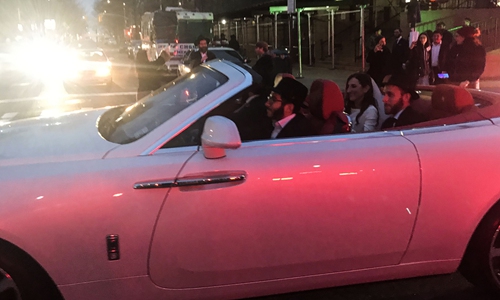Her interviews with the Rebbe were deeply influential on Israeli society
Geulah Cohen, a leading Israeli activist and political leader who fought for independence as a member of the Jewish underground during the final years of the British Mandate, and became a mainstay of Israel’s ideological right—first as a journalist and then as a member of the Knesset—passed away on Wednesday. She was 93.
Born in Tel Aviv in 1925, Cohen joined Menachem Begin’s underground Etzel movement fighting the British as a teenager and later moved to the more radical Lehi, where she worked alongside Yitzchak Shamir, serving as the movement’s radio announcer. She was captured by the British in 1946 and sentenced to a seven-year jail term, but escaped a year later.
Soon after the War of Independence, Cohen became one of the fledgling state’s most prominent journalists, serving as a writer and editorial board member of Maariv, Israel’s highest-circulation daily newspaper. She married fellow Lehi member Emanuel Hanegbi. Their son, MK Tzachi Hanegbi, is Israel’s Regional Cooperation Minister.

In 1964, Cohen traveled to New York as a correspondent for Maariv for a wide-ranging interview with the Rebbe, Rabbi Menachem M. Schneerson, of righteous memory. Her subsequent articles in Maariv and other national publications based on that and subsequent interviews and written correspondence with the Rebbe were transformational in reframing the Israeli public’s discussion on national security, the integrity of the Holy Land, and the potential of the nation’s youth. It was personally transformational for Cohen as well.
“I have been in the company of wise men, men of great learning and intelligence, men who were superior artists,” she wrote of her first encounter with the Rebbe. “But sitting opposite a true believer is quite a different matter.”
“After having met a wise man you remain the same as before—you have become neither less of a fool nor more of a sage,” she continued. “The education of the man of learning hardly rubs off on you, nor does the artist endow you with any of his talents or inspiration. Not so with a believer. After having met him you are no longer the same. Though you may not have accepted his faith, you have nevertheless been embraced by it. For the true believer believes in you as well.”
(‘The Believer,’ excerpts of Cohen’s account of her first encounter with the Rebbe, can be read here.)
Cohen subsequently had a number of hours-long one-on-one audiences with the Rebbe, and they exchanged written correspondence as well—all of which yielded a number of deeply influential articles that were widely circulated in the Israeli press, articulating the Rebbe’s positions on Israel’s security and the integrity of the Holy Land.
Greatest Legislative Achievement
Cohen entered political life in 1972 as part of Menachem Begin’s Herut party, and was elected to the Knesset the following year when Herut was merged into the Likud. Staunchly opposed to giving up any of the lands captured in the 1967 Six-Day War, she left the Likud to form her own political party in 1979 in opposition to the Camp David Accords. During her time in the Knesset, she was a member of the Foreign Affairs and Defense committees, and was an active supporter of ongoing Jewish settlement in Judea and Samaria.

She would recount that her greatest legislative achievement was the enactment of the “Basic Law on Jerusalem,” which was enacted in 1980, making it a matter of foundational national law that “united Jerusalem is the capital of Israel.” In 2003, she was awarded the Israel Prize, the nation’s highest civilian honor, in recognition of “a lifetime of service to the nation.”
“I had the privilege to grow up with a great woman whose entire life was dedicated to the integrity of the homeland, the ingathering of the exiles, and to the education of the future generation,” said her son on announcing her passing. “Her love for the people did not overshadow her love as a mother and her dedication as a grandmother.”
Predeceased by her husband in 1975, Cohen is survived by her son and grandchildren. She was laid to rest on Dec. 19 at the Mount of Olives in Jerusalem.


